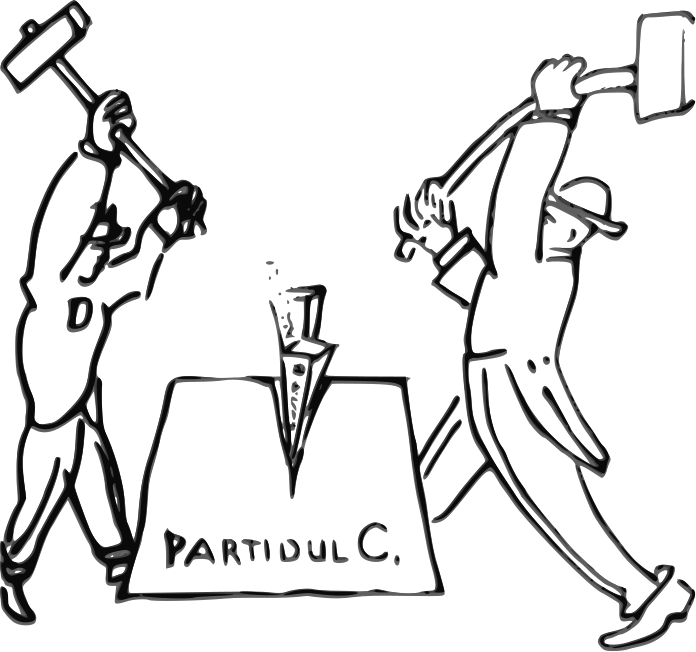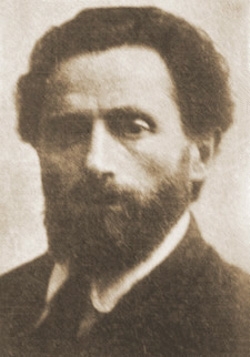|
21 Conditions
The Twenty-one Conditions, officially the Conditions of Admission to the Communist International, refer to the conditions, most of which were suggested by Vladimir Lenin, to the adhesion of the socialist parties to the Third International (Comintern) created in 1919. The conditions were formally adopted by the Second Congress of the Comintern in 1920. Content The conditions were: SFIO congress During the December 1920 Tours Congress of the French Section of the Workers' International (SFIO), the 21 conditions were rejected although the majority, led by Fernand Loriot, Boris Souvarine, Marcel Cachin, and Ludovic Frossard, adhered to the Third International, creating the French Section of the Communist International (SFIC), which would later take the name of the French Communist Party (PCF). PSOE congress At the July 1920 PSOE congress Fernando de los Ríos proposed that the PSOE should join the Communist International only if defined conditions were met. He and Daniel Anguian ... [...More Info...] [...Related Items...] OR: [Wikipedia] [Google] [Baidu] |
Vladimir Lenin
Vladimir Ilyich Ulyanov. ( 1870 – 21 January 1924), better known as Vladimir Lenin,. was a Russian revolutionary, politician, and political theorist. He served as the first and founding head of government of Soviet Russia from 1917 to 1924 and of the Soviet Union from 1922 to 1924. Under his administration, Russia, and later the Soviet Union, became a one-party socialist state governed by the Communist Party. Ideologically a Marxist, his developments to the ideology are called Leninism. Born to an upper-middle-class family in Simbirsk, Lenin embraced revolutionary socialist politics following his brother's 1887 execution. Expelled from Kazan Imperial University for participating in protests against the Russian Empire's Tsarist government, he devoted the following years to a law degree. He moved to Saint Petersburg in 1893 and became a senior Marxist activist. In 1897, he was arrested for sedition and exiled to Shushenskoye in Siberia for three years, where he married ... [...More Info...] [...Related Items...] OR: [Wikipedia] [Google] [Baidu] |
Rudolf Hilferding
Rudolf Hilferding (10 August 1877 – 11 February 1941) was an Austrian-born Marxism, Marxist economist, Socialism, socialist theorist,International Institute of Social History, ''Rodolf Hilferding Papers''. http://www.iisg.nl/archives/en/files/h/10751012.php politician and the chief theoretician for the Social Democratic Party of Germany (SPD) during the Weimar Republic,William Smaldone, Smaldone, William, ''Rudolf Hilferding and the total state.'', 1994. http://www.encyclopedia.com/doc/1G1-15867926.html being almost universally recognized as the SPD's foremost theoretician of this century.David E. Barclay, Eric D. Weitz, Michael Kreile. ''Between Reform and Revolution: German Socialism and Communism from 1840 to 1990'' https://books.google.com/books?id=hpzno0qNY34C&pg=PA373 He was also a physician. He was born in Vienna, where he received a doctorate having studied medicine. After becoming a leading journalist for the SPD, he participated in the German Revolution of 1918–19, ... [...More Info...] [...Related Items...] OR: [Wikipedia] [Google] [Baidu] |
Ludovic Frossard
Ludovic-Oscar Frossard (5 March 1889 – 11 February 1946), also known as L.-O. Frossard or Oscar Frossard, was a French socialist and communist politician. He was a founding member in 1905 and Secretary-General of the French Socialist Party (SFIO) from 1918 to 1920, as well as a founding member and Secretary-General of the French Communist Party (PCF) from 1920 to 1922. On 1 January 1923 Frossard resigned his positions and left the Communist movement over political differences. Frossard briefly attempted to establish an independent Communist political organization before returning to the ranks of the SFIO, gaining election to parliament under that party's banner in 1928, 1932, and 1936. From 1935 until 1940 Frossard held a series of ministerial positions in successive governments of Pierre Laval, Albert Sarraut, Camille Chautemps, Léon Blum, Édouard Daladier, Paul Reynaud, and the first government of Philippe Pétain. Following the armistice between France and Nazi Germany ... [...More Info...] [...Related Items...] OR: [Wikipedia] [Google] [Baidu] |
Marcel Cachin
Marcel Cachin (20 September 1869 – 12 February 1958) was a French Communist politician and editor of the daily newspaper ''L'Humanite''. In 1891, Cachin joined Jules Guesde's French Workers' Party (POF). In 1905, he joined the new French Section of the Workers' International (SFIO) and won election to the Chamber of Deputies representing the Seine in 1914. He rallied the Union sacrée during the First World War and was sent to Russia in a mission in 1917. On that occasion he strongly supported Kerensky's Provisional Government, which was pledged to continue Russia's participation in World War I, and denounced Lenin and the Bolsheviks. In 1918, he was one of the speakers at a patriotic rally held at Strasbourg, to celebrate the city's return to French rule. However, following the end of the war, there was a leftward shift among Cachin's grassroots supporters and a growing sympathy for the October revolution. In 1920 at the Tours Congress, Cachin became one of the founder ... [...More Info...] [...Related Items...] OR: [Wikipedia] [Google] [Baidu] |
Boris Souvarine
Boris Souvarine (1 November 1895 – 1 November 1984), also known as Varine, was a French Marxist, communist activist, essayist and journalist. A founding member of the French Communist Party, Souvarine is noted for being the only non-Russian communist to have been a member of the Comintern for three years in succession. 'Historical Note', Preface to Boris Souvarine Papers, Houghton Library, Harvard College Library, Harvard University He famously authored the first biography of , published in 1935 as ''Staline, Aperçu Historique du Bolchévisme'' (''Stalin, Historic Overview of Bolshevism'') and kept close correspondence with |
Fernand Loriot
Fernand Loriot (10 October 1870 – 12 October 1932) was a French teacher who was active in forming the teachers' union. He took a pacifist stance during World War I. He was one of the founders of the French Communist Party. Early years Loriot was born on 10 October 1870 in Ceton, Orne. He became a member of the Socialist Party in 1901, and was an activist in the teachers' union. He defied the courts and refused to dissolve the union when the government took action after the Congress of Chambéry. As Louis Bouët recalled in ''L'école émancipée'', after the Congress of Chambéry in 1912, the teacher's union was in turmoil and was being repressed by the authorities. Loriot took the position of treasurer in the new federal board created by the Seine union. At the Congress of Bourges in 1913 Émile Glay, who had called on Pierre Laval for help as counsel for the Federation, said to André Léon Chalopin that nobody would be left in the Seine since their licence to teach would b ... [...More Info...] [...Related Items...] OR: [Wikipedia] [Google] [Baidu] |
French Section Of The Workers' International
The French Section of the Workers' International (french: Section française de l'Internationale ouvrière, SFIO) was a political party in France that was founded in 1905 and succeeded in 1969 by the modern-day Socialist Party. The SFIO was founded during the 1905 Globe Congress in Paris as a merger between the French Socialist Party and the Socialist Party of France in order to create the French section of the Second International, designated as the party of the workers' movement. The SFIO was led by Jules Guesde, Jean Jaurès (who quickly became its most influential figure), Édouard Vaillant and Paul Lafargue (Karl Marx's son in law), and united the Marxist tendency represented by Guesde with the social-democratic tendency represented by Jaurès. The SFIO opposed itself to colonialism and to militarism, although the party abandoned its anti-militarist views and supported the national union government (french: link=no, Union nationale) facing Germany's declaration of war on F ... [...More Info...] [...Related Items...] OR: [Wikipedia] [Google] [Baidu] |
Tours Congress
The Tours Congress was the 18th National Congress of the French Section of the Workers' International, or SFIO, which took place in Tours on 25–30 December 1920. During the Congress, the majority voted to join the Third International and create the French Section of the Communist International, which became the French Communist Party in 1921. The SFIO divided itself in three factions during the Congress: * The larger one gathered those who had accepted the Third International's 21 Conditions behind Fernand Loriot, Boris Souvarine, Ludovic Frossard, and Marcel Cachin. They did not, however, accept all of Lenin's conditions, and no vote on the matter took place. This left-wing faction, formed by the younger leaders of the party and most of the SFIO's members, obtained three-quarters of the votes and split away to form the French Section of the Communist International (''Section Française de l'Internationale Communiste'', or SFIC). They took with them the party paper ''L'Humanit ... [...More Info...] [...Related Items...] OR: [Wikipedia] [Google] [Baidu] |
Soviet (council)
Soviets (singular: soviet; rus, сове́т, sovét, , literally "council" in English) were Political organisation, political organizations and governmental bodies of the former Russian Empire, primarily associated with the Russian Revolution, which gave the name to the latter state of the Soviet Union. Soviets were the main form of government in the Russian Soviet Federative Socialist Republic, Russian SFSR, Makhnovshchina, Free Territory, and to a much lesser extent were active in the Russian Provisional Government. It also can mean any workers' council that is Socialism, socialist such as the Irish soviets. Soviets do not inherently need to adhere to the ideology of the later Soviet Union. Etymology "Soviet" is derived from a Russian language, Russian word meaning council, assembly, advice, harmony, or concord, uk, рада (''rada''); pl, rada; be, савет; uz, совет; kk, совет/кеңес; ka, საბჭო; az, совет; lt, taryba; ro, soviet (Mo ... [...More Info...] [...Related Items...] OR: [Wikipedia] [Google] [Baidu] |
Democratic Centralism
Democratic centralism is a practice in which political decisions reached by voting processes are binding upon all members of the political party. It is mainly associated with Leninism, wherein the party's political vanguard of professional revolutionaries practised democratic centralism to elect leaders and officers, determine policy through free discussion, and decisively realise it through united action.Lenin, Vladimir (1906)"Report on the Unity Congress of the R.S.D.L.P." Marxists Internet Archive. Retrieved 14 February 2020. Democratic centralism has also been practised by social democratic and |
Profintern
The Red International of Labor Unions (russian: Красный интернационал профсоюзов, translit=Krasnyi internatsional profsoyuzov, RILU), commonly known as the Profintern, was an international body established by the Communist International (Comintern) with the aim of coordinating communist activities within trade unions. Formally established in 1921, the Profintern was intended to act as a counterweight to the influence of the so-called "Amsterdam International", the social democratic International Federation of Trade Unions, an organization branded as class collaborationist and an impediment to revolution by the Comintern. After entering a period of decline in the middle 1930s, the organization was finally terminated in 1937 with the advent of the Popular Front. Organizational history Preliminary organization In July 1920, at the behest of Comintern head Grigory Zinoviev, the 2nd World Congress of the Communist International established a temporary ... [...More Info...] [...Related Items...] OR: [Wikipedia] [Google] [Baidu] |
Second International
The Second International (1889–1916) was an organisation of socialist and labour parties, formed on 14 July 1889 at two simultaneous Paris meetings in which delegations from twenty countries participated. The Second International continued the work of the dissolved First International, though excluding the powerful anarcho-syndicalist movement. While the international had initially declared its opposition to all warfare between European powers, most of the major European parties ultimately chose to support their respective states in World War I. After splitting into pro-Allied, pro-Central Powers, and antimilitarist factions, the international ceased to function. After the war, the remaining factions of the international went on to found the Labour and Socialist International, the International Working Union of Socialist Parties, and the Communist International. History Pre-foundation conferences (1881–1889) The foundation of a new international was first discussed at ... [...More Info...] [...Related Items...] OR: [Wikipedia] [Google] [Baidu] |





